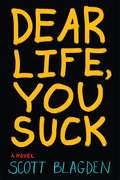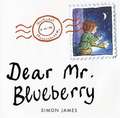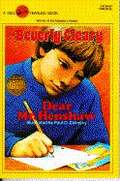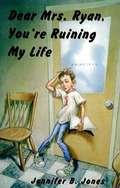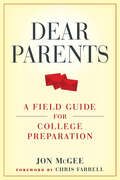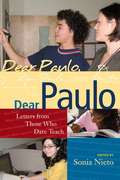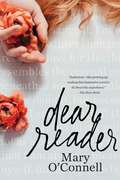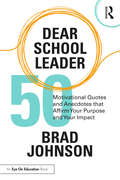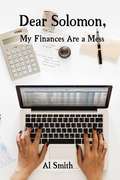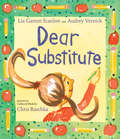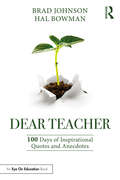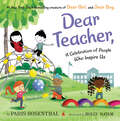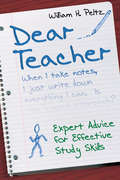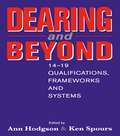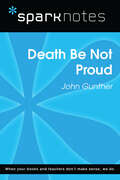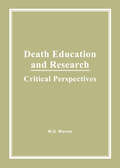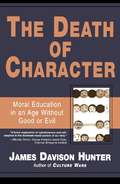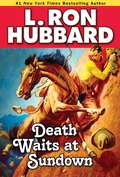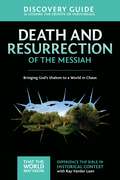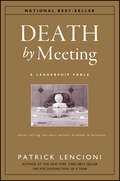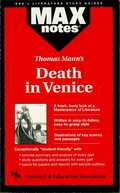- Table View
- List View
Dear Life, You Suck
by Scott Blagden"The shrinkadinks think I have a screw loose. Ain't playing with a full deck. Whacked-out wiring. Missing marbles. " Irreverent, foulmouthed seventeen-year-old Cricket is the oldest ward in a Catholic boys' home in Maine--and his life sucks. With prospects for the future that range from professional fighter to professional drug dealer, he seems doomed to a life of "criminal rapscallinity. " In fact, things look so bleak that Cricket can't help but wonder if his best option is one final cliff dive into the great unknown. But then Wynona Bidaban steps into his world, and Cricket slowly realizes that maybe, just maybe, life doesn't totally suck.
Dear Malala, We Stand with You
by Rosemary MccarneyAn inspiring letter to Malala Yousafzai, winner of the 2014 Nobel Peace Prize, that is both a show of support and a call to action for girls around the world. Malala became the youngest person to win the Nobel Peace Prize after she survived being shot in the head by the Taliban for speaking out in favor of a girl's right to an education. She survived this brutal attack and has emerged as a very powerful voice for social justice in the world. Dear Malala, We Stand with You captures the impact Malala has had on girls from all walks of life. In powerfully simple language and stunning photographs, the struggles from poverty and violence faced by girls everywhere become a catalyst for change. The book includes an excerpt from Malala's UN speech and provides readers with ways they can help and participate. Malala's bravery has shown that one person and one voice is enough to change the world. As UN Secretary-General Ban Ki-moon said, the terrorists are most afraid of "the girl with a book." Author Rosemary McCarney has over 20 years of international development work and runs the Canadian operations of Plan International as President and CEO.From the Hardcover edition.
Dear Mr. Blueberry
by Simon JamesIt is vacation time, so Emily has to write to her teacher for help. "Dear Mr. Blueberry, I love whales very much and I think I saw one in my pond today. Please send me some information on whales." Mr. Blueberry answers at once, pointing out that whales live in salt water, not in ponds, so it can't be a whale. Emily and Mr. Blueberry trade letters about the whale. In her last letter, Emily has a happy surprise to tell Mr. Blueberry, and all is well.
Dear Mr. Henshaw (Leigh Botts #1)
by Beverly ClearyBeverly Cleary's Newbery Medal-winning book explores the thoughts and emotions of a sixth-grade boy, Leigh Botts, in letter form as he writes to his favorite author, Boyd Henshaw.<P><P> After his parents separate, Leigh Botts moves to a new town with his mother. Struggling to make friends and deal with his anger toward his absent father, Leigh loses himself in a class assignment in which he must write to his favorite author. When Mr. Henshaw responds, the two form an unexpected friendship that will change Leigh's life forever.
Dear Mrs. Ryan, You're Ruining My Life
by Jennifer B. JonesWhat do you do when your mother takes embarrassing moments from your life and includes them in books read by kids all over the country? If you're Harvey Ryan, you hatch a plan to focus your mother on something, or someone else. So Harvey decides to set his mom up with the only eligible man he knows, the school principal. But when his plan works, Harvey quickly realizes having his mother date his principal is even worse than her being a famous author. One mother can sure cause a lot of trouble in a boy's life.
Dear Parents: A Field Guide for College Preparation
by Jon McGeeFew moments in parenting are as fraught as preparing your kid for college. Let a trusted pro show you how it’s done.Written for parents and families of college-bound students, Jon McGee’s Dear Parents is an essential tool you’ll need to navigate the complex and often emotional challenge of getting your daughter or son prepared for—and through—college. Organized chronologically, the book takes readers through the stages of childhood leading up to college, as well as the process of searching for and selecting a college. From the decisions you make during your child’s early years to the process of setting up their dorm room, this book provides parents with insights, wisdom, and guidance about college, college preparation, and choosing a college. Letters written by college and educational professionals, all with children, frame and illuminate each chapter. Drawing on their personal and professional experience, these experts offer practical and sympathetic advice about preparing for college. The book concludes with insights about sending children off to college and the appropriate roles for parents as your children experience these important years. Undergirded by research but informed by on-the-ground insight, Dear Parents is designed to both engage and inform while demystifying the daunting and ever-changing process of entering college."If you’ve picked up this book, my guess is you don’t need convincing that there is a lifelong return from a college education. You want to understand the process better and you’d like to help your teen smartly navigate their choices. You picked wisely if that’s the case.... Jon McGee is a wonderful guide, shedding light on the mysterious process of applying to college while bringing much insight to the inevitable trade-offs."—from the foreword by Chris Farrell, Marketplace
Dear Parents: A Field Guide for College Preparation
by Jon McGee“An intelligent, authentic, and humorous approach in helping your student select the best college?academically, personally, and financially.” —Todd Rinehart, Vice Chancellor for Enrollment, University of DenverWritten for parents and families of college-bound students, Jon McGee’s Dear Parents is an essential tool you’ll need to navigate the complex and often emotional challenge of getting your daughter or son prepared for—and through—college. Organized chronologically, the book takes readers through the stages of childhood leading up to college, as well as the process of searching for and selecting a college. From the decisions you make during your child’s early years to the process of setting up their dorm room, this book provides parents with insights, wisdom, and guidance about college, college preparation, and choosing a college.Letters written by college and educational professionals, all with children, frame and illuminate each chapter. Drawing on their personal and professional experience, these experts offer practical and sympathetic advice about preparing for college. The book concludes with insights about sending children off to college and the appropriate roles for parents as your children experience these important years. Undergirded by research but informed by on-the-ground insight, Dear Parents is designed to both engage and inform while demystifying the daunting and ever-changing process of entering college.“Jon McGee is the equivalent of your higher education Sherpa. He has brilliantly succeeded in making the complex and nerve-racking expedition into college search and selection easier to understand. This book is an indispensable resource for students and families embarking on the journey.” —Beck A. Taylor, President, Whitworth University
Dear Paulo: Letters from Those Who Dare Teach (Series in Critical Narrative)
by Sonia NietoDear Paulo: Letters from Those Who Dare Teach is a heartfelt response from teachers, academics, and community workers to the work of the internationally renowned educator and author Paulo Freire. From newly minted teachers terrified of facing their first day in the classroom to seasoned academics whose work has largely been inspired by Freire, this collection, accompanied by photographs of Freire with some of the letter writers, is both a loving memorial and a call to action to work for social justice, praxis, and democracy, ideals envisioned and brilliantly articulated by Paulo.
Dear Reader: A Novel
by Mary O'Connell“Dear Reader is imaginative and exhilarating and genre-bending and one of the best YA novels of the year.” —BookRiotGilmore Girls meets Wuthering Heights in Mary O'Connell's Dear Reader, a whip-smart, poignant, modern-day take on Emily Brontë’s classic novel.For seventeen-year-old Flannery Fields, the only respite from the plaid-skirted mean girls at Sacred Heart High School is her beloved teacher Miss Sweeney’s AP English class. But when Miss Sweeney doesn't show up to teach Flannery's favorite book, Wuthering Heights, leaving behind her purse, Flannery knows something is wrong. The police are called, and Flannery gives them everything—except Miss Sweeney's copy of Wuthering Heights. This she holds onto. And good thing she does, because when she opens it, it has somehow transformed into Miss Sweeney's real-time diary. It seems Miss Sweeney is in New York City—and she's in trouble. So Flannery does something very unFlannery-like: she skips school and sets out for Manhattan, with the book as her guide. But as soon as she arrives, she meets a boy named Heath. Heath is British, on a gap year, incredibly smart—yet he's never heard of Albert Einstein or Anne Frank. In fact, Flannery can't help thinking that he seems to have stepped from the pages of Brontë's novel. Could it be that Flannery is spending this topsy-turvy day with her ultimate fictional romantic hero, Heathcliff, reborn in the twenty-first century?
Dear School Leader: 50 Motivational Quotes and Anecdotes that Affirm Your Purpose and Your Impact
by Brad JohnsonDear school leader, you have a big impact on your teachers and students! In this follow-up to the bestselling Dear Teacher, motivational speaker Dr. Brad Johnson provides 50 inspiring quotes for leaders, along with stories and practical takeaways, to thank you for all that you do and to help you thrive in your role. Dr. Brad Johnson covers topics such as focusing on your assets instead of your agenda; remembering your purpose; embracing failure; overcoming imposter syndrome and decision fatigue; celebrating the small things; becoming a world class you; and more! The book is perfect to gift to the principals and other administrators in your life, or for your own nightly reading as you reflect on the day. The uplifting advice will help you focus on your purpose in this profession – and will help you remember that even when you’re having a bad day, you’re making a positive difference!
Dear Solomon, My Finances Are a Mess
by Al SmithTaming the Money Beast is often a conquest that is never achieved even by those who put forth the effort. One could get multiple university degrees with honors, but never be instructed on even the basics of handling money.Money is simply a tool. In the hands of someone who has acquired and cultivated the skills to use it, money can bring about incredible benefits to be enjoyed by many. In the hands of a novice or one void of skills, money can bring tremendous trouble and even destroy lives. The pursuit of wisdom and understanding in expertly using this tool, is a worthy pursuit.This book draws from the wisdom of Solomon, the wealthiest man to ever live and a man God endowed with &“a wise and discerning heart&” like none other (1 Kings 3:12).The wisdom of Solomon is displayed everywhere you look. Study any Fortune Five Hundred company, and you will discover that their success can be attributed to following this wisdom. Study companies that have failed and you will discover many of Solomon&’s proverbs have been violated. The same holds true for individuals. The principles taught in Proverbs are divine laws that are always active just as much as the laws of physics are active.The Book of Proverbs, primarily authored by Solomon, is filled with practical wisdom in virtually all areas of life, including being packed with verses devoted to financial matters. This wisdom is ageless and will benefit all who set their hearts to learn and discern.Contained within the pages of this book, are the essential principle of being a seeker of wisdom and knowledge. You will learn the vital importance of developing character, cultivating integrity, and guarding your reputation. On how your life should be marked by being an excellent worker. This requires skills in planning, setting priorities, recognizing and seizing opportunities, and avoiding the pitfalls of pursuing riches at the expense of all else.The vital characteristic of focus and commitment will help you with motives, curb your impatience, reveal greed, and unpack the dangers of a lottery mentality. The peril of accumulating debt, the foolishness of perpetually overspending, and the tendency to be wasteful are examined.Falsehoods are exposed. Solomon is not interested in making sure he does not offend you he is interested in being brutally honest with you. So, this book includes admonitions on tempering false expectations, understanding false impressions, avoiding false security, and basing your financial life on truth.As with any endeavor, one must recognize and eradicate the weeds that will overtake progress include compromise, envy, phoniness, injustice, and arrogance. Solomon is clear on the folly of allowing these weeds to take root.Having proper attitudes are also important principles discussed in this book. We must learn the value of generosity, the wisdom of teamwork, and the damaging role that unchecked selfishness can play.Of course, handling money wisely is the essence of this book. Preparation is the key and you cannot skip or rush over this key. Preparation always precedes the proper use of money. Paying attention to details will serve you well. Knowing and understanding where you stand each step of the way is essential.These principles work regardless of your spiritual beliefs, but there is a spiritual component at work in these truths. Without fail, if this wisdom is diligently followed and incessantly applied, you will at times be amazed at the results; results that cannot easily be explained.This book will take you on a journey if you are game; it is a long journey but an exciting one. It will give you a spring in your step and have you eager to arise in the morning. It will give you a sense of true accomplishment before as you rest you head on the pillow at night. I promise that you won&’t be sorry if you make the commitment and resolve to finally understand the rules of the financial road. The path is open before you – all are welcome!
Dear Substitute (Hyperion Picture Book (eBook))
by Liz Garton Scanlon Audrey VernickWhen a substitute teacher named Miss Pelly comes to class, one student bristles at the change in routine-Miss Pelly doesn't follow the rules like Mrs. Giordano. But in time, our student learns that even though the substitute may do things a little differently, and she may be a bit silly, mixing things up might not be so bad. Told in a series of epistolary poems, this funny, relatable picturebook is a great fit for classrooms and for any child nervous about new experiences.
Dear Teacher: 100 Days of Inspirational Quotes and Anecdotes
by Brad Johnson Hal BowmanDear teacher, you are appreciated! This inspirational book, written by motivational speakers Brad Johnson and Hal Bowman, provides daily encouragement to thank you for all that you do in the classroom and beyond. Johnson and Bowman offer quotes and powerful stories for 100 days of the school year, highlighting topics such as celebrating small successes, bringing out the best in your students, knowing your worth, and being all in. The book is perfect for teachers of all grade levels, and for principals to buy their teachers for schoolwide morale, to keep teachers feeling their best. The uplifting advice will remind you why you’ve chosen this profession and the impact you have on others!
Dear Teacher: A Celebration of People Who Inspire Us
by Paris RosenthalA NEW YORK TIMES BESTSELLER!From the #1 New York Times bestselling team behind Dear Girl, and Dear Boy, comes a heartfelt thank-you letter written to educators, coaches, leaders, role models, mentors, and heroes everywhere! A perfect gift for back to school, National Teachers' Day, Teacher Appreciation Week, and the last day of school.Filled with gratitude, Dear Teacher, thanks all the people that empower and inspire little ones to be themselves and overcome all of life’s obstacles.With the same tenderness as Dear Girl, and Dear Boy, Paris’s charming text and Holly Hatam’s stunning illustrations come together beautifully to express well-deserved appreciation for teachers of all kinds.Perfect for fans of the teacher appreciation classic Because I Had a Teacher who are looking for a new gift to give.
Dear Teacher: Expert Advice for Effective Study Skills
by William H. PeltzAddresses common defense mechanisms and rationalizations students use to avoid studying, and offers ready-to-use and easy-to-understand skills for middle and high school classrooms.
Dear Wendy
by Ann ZhaoTwo aromantic and asexual college students explore friendship, relationships, and queer identities in this bestselling debut described as "The platonic love story of my dreams!" by Alice Oseman, New York Times-bestselling creator of Heartstopper!Sophie Chi is in her first year of college and has long accepted her aroace (aromantic and asexual) identity. She knows she’ll never fall in love, but she enjoys running an Instagram account that offers relationship advice to students at her school. No one except her roommate can know that she’s behind the incredibly popular “Dear Wendy” account.When Joanna “Jo” Ephron (also a first-year student and aroace) created their “Sincerely Wanda” account, it wasn’t at all meant to be taken seriously. But now they might have a rivalry of sorts with Wendy’s account? Oops. As if Jo’s not busy enough having existential crises over gender identity, whether she’ll ever truly be loved, and the possibility of her few friends finding The One then forgetting about her!While tensions are rising online, Sophie and Jo grow closer in real life, especially once they realize their shared aroace identity. Will their friendship survive if they learn just who’s behind the Wendy and Wanda accounts?This book is a work of fiction, but it deals with real issues including depictions of aphobia (discrimination against asexual and aromantic individuals), anxiety/stress from negative social media attention, frank discussions of sex and sexuality, and various diaspora feelings.
Dearing and Beyond: 14-19 Qualifications, Frameworks and Systems
by Hodgson, Ann Spours, Ken (both of Institute of Education, University of London)Focuses on the 14-19 curriculum and qualification debates around the Dearing Review. It identifies the main parameters of this area of policy development for the future and argues strongly for a staged process to reform which ultimately leads to a unified 14-19 qualifications system.
Death Be Not Proud (SparkNotes Literature Guide Series)
by SparkNotesDeath Be Not Proud (SparkNotes Literature Guide) by John Gunther Making the reading experience fun! Created by Harvard students for students everywhere, SparkNotes is a new breed of study guide: smarter, better, faster.Geared to what today's students need to know, SparkNotes provides:chapter-by-chapter analysis explanations of key themes, motifs, and symbols a review quiz and essay topics Lively and accessible, these guides are perfect for late-night studying and writing papers.
Death Education and Research: Critical Perspectives
by William G WarrenA critical review of research and reflection in the area of death, with special emphasis on death education. Thought-provoking, often controversial reviews of and reactions to the current general domain of death phenomena--specifically death education--are addressed in this book. The author, skeptical that we can do very much with the phenomenon of death and dying, especially in relation to our efforts at addressing it educationally, explores the philosophical, psychological, socio-cultural, and theoretical aspects and raises critical questions that will challenge proponents of death education. Both advocates and critics of death education in particular, and death research in general, will benefit from this intellectually stimulating volume that sounds a cautionary note, yet offers some positive suggestions for the future of death education. Professionals interested in any aspect of death education will be intrigued by this thorough examination of death education from several perspectives.
Death Of Character: Moral Education in an Age Without Good or Evil
by James Davison HunterThe Death of Character is a broad historical, sociological, and cultural inquiry into the moral life and moral education of young Americans based upon a huge empirical study of the children themselves. The children's thoughts and concerns-expressed here in their own words-shed a whole new light on what we can expect from moral education. Targeting new theories of education and the prominence of psychology over moral instruction, Hunter analyzes the making of a new cultural narcissism.
Death Threat (Sweet Valley High #110)
by Francine Pascal Kate WilliamSue Gibbons, who's been staying with the Wakefields, has been kidnapped just weeks after gorgeous Jeremy Randall left her at the altar for Jessica! Now Sue's captor is threatening to kill her if the Wakefields don't pay up. Jeremy insists he'll find the kidnapper, but soon Jessica becomes suspicious of him.
Death Waits at Sundown
by L. Ron HubbardSaddle up for excitement with this riveting tale. When Lynn Taylor's kid brother, Lee, gets framed for stage robbery, cattle rustling and murder, the boy swears his innocence and instead accuses McCloud, head of the vigilante committee responsible for removing the town's former sheriff.To save Lee from hanging the following night, Lynn hatches a wild plan to rob the next stagecoach with the help of the ex-sheriff--hoping it will raise doubts about Lee's guilt if the crimes continue. But Lynn gets more than he bargained for when he's snared by McCloud's men, and the time to the hanging gallops rapidly his way. ALSO INCLUDES THE WESTERN STORIES "RIDE 'EM COWBOY" AND "THE BOSS OF THE LAZY B""Hubbard's trio has one thing in common--rough and tumble action with a twist, and all are a great read." --True West Magazine * An International Book Awards Winner
Death and Resurrection of the Messiah Discovery Guide: Bringing God's Shalom to a World in Chaos (That the World May Know)
by Ray Vander Laan Stephen And SorensonThis ten-session small group Bible study (DVD/digital video sold separately), Death and Resurrection of the Messiah, from noted teacher and historian, Ray Vander Laan, is volume four of the That the World May Know series. In it, Vander Laan illustrates how Jesus’ call to follow him turned the world upside down, and learn how confronting evil can be loudly proclaiming the name of Jesus or quietly caring for someone in need. Filmed on location in Israel, Faith Lessons is a unique video series that brings God's Word to life with astounding relevance. By weaving together the Bible's fascinating historical, cultural, religious, and geographical contexts, teacher and historian Ray Vander Laan reveals unique insights into the Scriptures' significance for modern believers. The Death and Resurrection of the Messiah (336 pages) includes ten sessions. Each lesson: Focuses on passages of Scripture explored in the DVD Includes sidebars, maps, photos and other study tools Features questions that facilitate discussion and inspire personal reflection Includes 30 personal Bible studies to help you deepen your learning experience between sessions, and turn lessons from the past into applications that impact how you live out your faith today. These illuminating "faith lessons" afford a new understanding of the Bible that will ground your convictions and transform your life. The Faith Lessons video series is ideal for use in small groups, personal and family Bible studies, and adult Sunday school. Individual believers and families will gain vital insights from long-ago times and cultures through this innovative approach to Bible study. This Discovery Guide is designed for use with the Death and Resurrection of the Messiah DVD (sold separately). Lessons include: When Storms Come – Sea of Galilee Piercing the Darkness – Kursi Gates of Hell– Caesarea Philippi City of the Great King Part 1 – The Temple City of the Great King Part 1 – Jerusalem The Lamb of God – Mount of Olives The Weight of the World – Capernaum/Gethsemane Roll Away the Stone – Garden Tomb Power to the People – Southern Stairs Total Commitment – Caesarea
Death by Meeting: A Leadership Fable...about Solving The Most Painful Problem In Business (J-b Lencioni Ser. #15)
by Patrick M. LencioniCasey McDaniel had never been so nervous in his life.In just ten minutes, The Meeting, as it would forever be known, would begin. Casey had every reason to believe that his performance over the next two hours would determine the fate of his career, his financial future, and the company he had built from scratch."How could my life have unraveled so quickly?" he wondered.In his latest page-turning work of business fiction, best-selling author Patrick Lencioni provides readers with another powerful and thought-provoking book, this one centered around a cure for the most painful yet underestimated problem of modern business: bad meetings. And what he suggests is both simple and revolutionary.Casey McDaniel, the founder and CEO of Yip Software, is in the midst of a problem he created, but one he doesn't know how to solve. And he doesn't know where or who to turn to for advice. His staff can't help him; they're as dumbfounded as he is by their tortuous meetings.Then an unlikely advisor, Will Peterson, enters Casey's world. When he proposes an unconventional, even radical, approach to solving the meeting problem, Casey is just desperate enough to listen.As in his other books, Lencioni provides a framework for his groundbreaking model, and makes it applicable to the real world. Death by Meeting is nothing short of a blueprint for leaders who want to eliminate waste and frustration among their teams, and create environments of engagement and passion.
Death in Venice (MAXNotes Literature Guides)
by Boria SaxREA's MAXnotes for Thomas Mann's Death in Venice MAXnotes offer a fresh look at masterpieces of literature, presented in a lively and interesting fashion. Written by literary experts who currently teach the subject, MAXnotes will enhance your understanding and enjoyment of the work. MAXnotes are designed to stimulate independent thought about the literary work by raising various issues and thought-provoking ideas and questions. MAXnotes cover the essentials of what one should know about each work, including an overall summary, character lists, an explanation and discussion of the plot, the work's historical context, illustrations to convey the mood of the work, and a biography of the author. Each chapter is individually summarized and analyzed, and has study questions and answers.
